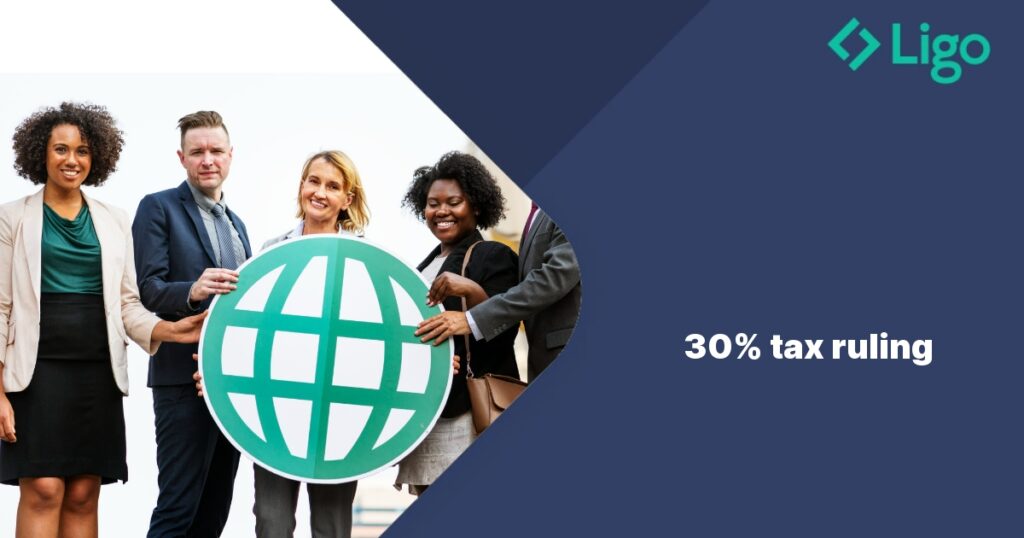Laatst geüpdatet op november 24, 2023
In this article we explain what the 30% ruling entails, who can make use of it, how you can apply for it and what changes are coming with the Belastingplan 2024 (Tax plan 2024). Read on and find out if the 30% ruling is applicable to your situation.
What is the 30% ruling?
The 30% ruling is an arrangement that allows employers to give employees who have come to the Netherlands from abroad to work here a tax-free allowance of up to 30% of wages.
This allowance is intended to cover additional costs incurred by these employees for their stay in the Netherlands, such as housing, travel, education and living expenses. These costs are also known as extraterritorial expenses.
The 30% rule is a flat-rate rule, which means that the employee does not have to prove that he or she actually incurred these costs. The employer also does not have to keep records of these expenses.
The 30% ruling has the advantage that the employee has to pay less tax on his or her salary and the employer has to pay less payroll tax to the Belastingdienst.
When can you use the 30% ruling?
Not everyone who comes to the Netherlands from abroad to work here is eligible for the 30% ruling. There are a number of conditions you must meet in order to take advantage of this arrangement.
The most important condition is that you have a specific expertise that is scarce or not present in the Dutch labor market. This is also called the expertise requirement. In addition, you must meet a minimum wage, a salary requirement and a number of other conditions. We will explain these conditions in more detail below:
Expertise requirement
The expertise requirement means that you have a specific expertise that is scarce or not present in the Dutch labor market. This is assessed based on your education, experience and salary. There are no set criteria to determine this, but the Tax Office does use some guidelines.
These include the level and duration of your education, the relevance of your education to your position, the nature and quality of your work experience, the level of your salary compared to the Dutch salary level, and the supply and demand of your expertise on the Dutch labor market.
Test wage
To use the 30% rule, you must earn a certain minimum wage that demonstrates your expertise. This is the test wage. The test wage is the wage you get without the 30% allowance. You must earn at least this amount to apply the rule.
The test wage depends on your age and education. If you are younger than 30 and have a master’s degree, the reference wage is €31,891 gross per year. This is without the tax-free allowances. For other employees (30 years or older or without a master’s degree), the test wage is €41,954 gross per year.
What if you earn less than the test wage?
If you earn less than the test wage, you cannot get the full 30% allowance. You will only receive a compensation on the difference between the reference wage and your salary. The allowance is then lower than 30% of your salary and you cannot take full advantage of the arrangement.
Conditions for the 30% ruling
In addition to the expertise requirement, the minimum wage and the test wage, there are a number of other conditions you must meet to take advantage of the 30% rule. These conditions are as follows:
- The employee in question was hired from abroad or seconded to the Netherlands;
- The employee in question is employed by a Dutch employer;
- The employee in question has lived more than 150 kilometers as the crow flies from the Dutch border for at least 16 months in the 24 months before he or she started working in the Netherlands;
- The employee must have a valid disposition;
- The employee in question is an expert who is difficult or impossible to find in the Dutch labor market. To determine this, the test wages are used below;
- If the employee is younger than 30 and has a Dutch master’s degree or a similar foreign title, a lower salary standard may apply. The employee in question will then have a fiscal wage of €31,891 in 2023, without counting the free allowances and the 30% rule;
- If the person turns 30, the high salary standard may apply the following month. This is €41,954;
- The exceptions to the salary standard are employees doing scientific research or doctors in training. No salary standard applies to them.
How does the 30% ruling work in practice?
Here are two examples of how the 30% rule works in practice:
- You are 35 years old and earn a salary of €100,000. Taking into account the 30% ruling, your taxable salary will be €70,000. With this, you meet the minimum salary requirement to receive the full 30% ruling, so you will receive a tax-free sum of €30,000.
- You are 35 years old and earn a salary of €50,000. If the 30% rule were fully taken into account, the taxable salary would be €35,000. This is lower than the required minimum salary and therefore not allowed. In this case, you can only partially benefit from the 30% rule, for a maximum amount of (€50,000 -/- €39,647) €10,353.
How can you use the 30 percent ruling?
If you meet all the conditions to use the 30% rule, you and your employer must submit a request to the Belastingdienst to apply the rule. You must submit this request within four months of your first working day in the Netherlands.
If you do this later, you can only apply the regulation from the month after the month in which you submitted the request. You can submit the request by filling out the form ‘Request for 30% payroll taxes’ and sending it to the Belastingdienst. You can findthis form on the website of the Belastingdienst.
The form must also include a number of attachments, such as a copy of your passport, a copy of your employment contract, a copy of your diplomas and an overview of your places of residence in the 24 months prior to your first day in the Netherlands.
The Belastingdienst will assess your request and send you a decree stating whether you are entitled to the 30% ruling and for what period. This decree is important, because without it your employer may not apply the regulation.
What is the duration of the decree?
The term of the decree is the period during which your employer may apply the 30% rule. The term of the decree depends on your personal situation and can vary from a few months to up to eight years. The duration is determined by the following factors:
- The date of your first day of work in the Netherlands.
- The period during which you previously lived or worked in the Netherlands.
- The period during which you lived or worked outside the Netherlands.
- The period during which you used the 30% ruling at another employer.
The Belastingdienst calculates the term of the decree using a formula that takes these factors into account. You can also calculate the term of your decree yourself using the calculation tool on the Belastingdienst website.
The term of the decree can be adjusted in the interim if your situation changes, for example if you change employers, if your salary changes or if you move abroad. You must always report these changes to the Belastingdienst so that your decision can be revised.
What happens to the ruling if you change employers?
If you change employment, you can in principle continue to apply the 30% rule, provided you continue to meet the conditions and your new employer agrees.
- You must then have a new employment contract with your new employer within three months of your last working day with your old employer.
- You and your new employer must also submit a new request to the Belastingdienst to apply the 30% ruling. You can use the same form as for your first request.
- You do not have to send any attachments, except a copy of your new employment contract. You do need to include your old decision, so the Belastingdienst can see that you were already entitled to the 30% ruling.
The Belastingdienst will then send you a new decision stating that you may apply the 30% ruling at your new employer. The term of your new decision is determined by the term of your old decision.Therefore, you cannot use the ruling for longer than you were originally allowed to.
How will the 30% ruling change with the 2024 Tax Plan?
The 30% ruling is being gradually reduced by an amendment passed in the 2024 Tax Plan. The regulation goes from 30% to 10% of the salary in a period of 5 years.
In the first 20 months of the period, you will still receive 30% of your salary as a tax-free allowance. Then this drops to 20% in the next 20 months. In the last 20 months, you only get 10% of your salary as tax-free compensation.
There is a transitional arrangement for employees who already had the 30% allowance in December 2023. They do not have to participate in the reduction of the compensation. This therefore applies to employees who already had the 30% rule, but also to employees coming to the Netherlands from abroad to work here before December 31, 2023. In addition, the following things change:
Abolition of partial foreign tax liability
Employees who have the 30% rule and live in the Netherlands can now still choose to be considered a foreign taxpayer for Box 2 (income from substantial interest) and Box 3 (income from savings and investments).
This is called partial foreign tax liability. This means that employees pay tax only on their Dutch income and not on their foreign income, even if they live in the Netherlands.
This is going to change due to an amendment adopted in the Tax Plan 2024. As of January 1, 2025, the partial foreign tax liability will be abolished. Employees who have the 30% ruling will then always be treated as domestic taxpayers and must therefore pay tax on their worldwide income.
However, there is a transitional arrangement for employees who already had the 30% ruling at the end of 2023. They may still use the partial foreign tax liability until 2026.
Capping of the 30% ruling
The 30% rule is further limited by the amendments that have been adopted. Last year’s Tax Plan already stated that as of January 1, 2024, the 30% will no longer apply to the part of the salary that exceeds the so-called Balkenende norm (‘WNT norm’, 2023: €223,000).
However, there is a transitional arrangement for this limitation for employees who had already received the 30% rule in December 2022, the limitation does not take effect on January 1, 2024, but only on January 1, 2026.
Employer can choose between 30% ruling or reimbursement of actual costs
Each year from January 1, 2023, the employer has the choice to give the employee a tax-free reimbursement of 30% of the salary or to reimburse the actual costs incurred by the employee for his stay in the Netherlands based on declarations.
Due to the various cuts to the 30% rule, it is wise to calculate the consequences of both choices so that you can make an informed decision.
Need help with the 30% percent ruling?
Do you have questions about the 30% ruling and changing regulations in 2024? Or do you need personal support? Then feel free to contact the lawyers at Ligo. We are ready to help you with any legal issues regarding this subject.
We at Ligo can also help you if you wish to set up a new BV. We offer you the opportunity to incorporate a limited liability company online, saving you a lot of time and money. At Ligo, you can incorporate a limited liability company within 5 working days and you will receive guidance from lawyers before, during and after the incorporation. What more could you want?
- Algemene vergadering van Aandeelhouders (AvA) - februari 28, 2024
- Essentiële contracten voor het oprichten van een BV - februari 28, 2024
- BTW-aangifte doen - februari 28, 2024










